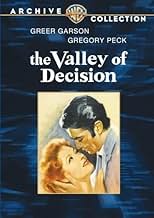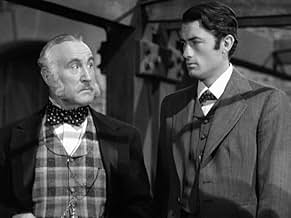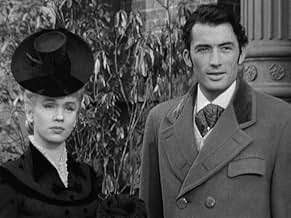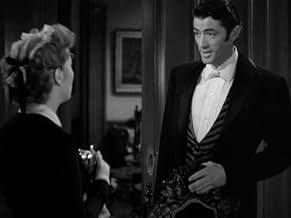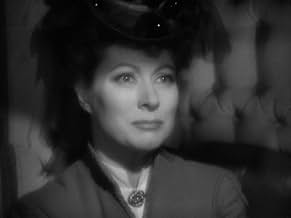IMDb-BEWERTUNG
7,3/10
2555
IHRE BEWERTUNG
Füge eine Handlung in deiner Sprache hinzuAn Irish maid falls for the son of her wealthy boss, though their disapproving fathers and a bitter strike at the steel mill complicate matters.An Irish maid falls for the son of her wealthy boss, though their disapproving fathers and a bitter strike at the steel mill complicate matters.An Irish maid falls for the son of her wealthy boss, though their disapproving fathers and a bitter strike at the steel mill complicate matters.
- Regie
- Drehbuch
- Hauptbesetzung
- Für 2 Oscars nominiert
- 4 Gewinne & 2 Nominierungen insgesamt
Empfohlene Bewertungen
When one thinks of Greer Garson, movies like "Mrs. Miniver" or "Pride and Prejudice" come to mind. And when one thinks of Gregory Peck, movies like "To Kill a Mockingbird" or "Gentleman's Agreement" come to mind. However, both of these terrific actors are fantastic in "The Valley of Decision," which I consider to be one of the forgotten classics of the 1940's. It was deservingly nominated for two Academy Awards, including a Best Actress nomination for Greer Garson. I believe she gives one of her most touching, heartfelt performances as Mary Rafferty. This movie is a must-see for all movie fans. I give it an enthusiastic 10 out of 10!
Okay, I'll admit that this movie is a bit heavy-handed at times. Lionel Barrymore's performance as Mary's father is not a subtle performance and the movie is a tad predictable at times. However, despite these minor shortcomings, this is a marvelous romantic flick from Hollywood's heyday and is a great early Gregory Peck vehicle.
Mary (Greer Garson) is a lovely poor lass who goes to work as a housekeeper in the home of the wealthy family (the Scotts) who own the local steel mill. This is problematic, as Mary's father was seriously injured in the mill and bears an intense hatred of the Scotts. It becomes even more problematic as, over time, handsome Paul Scott (Peck) falls for her and asks for her hand in marriage! Yikes! However, this is only about half-way through the movie--what happens next you'll need to find out yourself.
Great performances (not just from the two leads but from capable supporting actors such as Donald Crisp and Dan Duryea), direction, sets and writing make this one of my personal favorites. Watch it!
Mary (Greer Garson) is a lovely poor lass who goes to work as a housekeeper in the home of the wealthy family (the Scotts) who own the local steel mill. This is problematic, as Mary's father was seriously injured in the mill and bears an intense hatred of the Scotts. It becomes even more problematic as, over time, handsome Paul Scott (Peck) falls for her and asks for her hand in marriage! Yikes! However, this is only about half-way through the movie--what happens next you'll need to find out yourself.
Great performances (not just from the two leads but from capable supporting actors such as Donald Crisp and Dan Duryea), direction, sets and writing make this one of my personal favorites. Watch it!
I viewed this movie and fell in love with the story of a family who owned a Pittsburg Steel Mill. What a great movie where determination and love of the steel mills helped preserve and shape the USA into a world power. The portrayal of steel workers along side the upper class was particularly interesting, because the owners are showed as observers and not really part of the sweat and steel, until Gregory Peck gives an awe inspiring speech about what its like working on the ground floor of a steel mill. I particularly enjoyed Gregory and Greer's on screen relationship and the difficulty of romantic relationships between two different classes. I thoroughly enjoyed this movie.
This MGM 1945 drama brought Greer Garson and Gregory Peck together for the first and only time. They make a terrific acting pair, at the peak of their careers, and ignite the screen with passionate intensity. Filmed in black and white it tells the story of the dispute between a steel manufacturer and the men that work in the mill. Miss Garson plays a pretty maid who takes a job in the lavish home of Pittsburgh steel magnate, wonderfully played by veteran actor Donald Crisp. Peck plays one of his sons, devoted to his father's mill who works diligently alongside some of the mill workers, notably Preston Foster, to bring a newer more modern way of producing better steel. Crisp has two other sons; Dan Duryea, a bit more greedy for the money rather than the work and Marshall Thompson as the youngest son, who tends to drink away his carefree lifestyle. There is also a daughter played by the talented Marsha Hunt in one of her best performances and certainly worthy of a supporting Oscar nomination. By the way Greer did get a Best Actress nomination for this.
The distinguished Gladys Cooper plays the matriarch of the family and befriends Greer, leaving her share of the mill. Trouble brews among Greer's family when her father, played by another veteran, Lionel Barrymore, an embittered man having lost the use of his legs in an accident in the mill, stirs up violence that has tragic consequences.
Jessica Tandy also gives a dynamic performance as Peck's wife and look for a very young Dean Stockwell as their son. If you like big stars and excellent featured actors along with a compelling story, this is a film for you. Directed by Tay Garnett.
The distinguished Gladys Cooper plays the matriarch of the family and befriends Greer, leaving her share of the mill. Trouble brews among Greer's family when her father, played by another veteran, Lionel Barrymore, an embittered man having lost the use of his legs in an accident in the mill, stirs up violence that has tragic consequences.
Jessica Tandy also gives a dynamic performance as Peck's wife and look for a very young Dean Stockwell as their son. If you like big stars and excellent featured actors along with a compelling story, this is a film for you. Directed by Tay Garnett.
In Pittsburgh in 1873, plucky Irish immigrant Greer Garson accepts a position as a servant in the mansion of steel magnate Donald Crisp, though her father was crippled in his mill. Inevitably, Greer and Gregory Peck (as the principled second son of the family) find themselves drawn to each other despite class differences, and surprisingly, his parents spprove. But a series of dramatic events -- a steelworkers' strike, three violent killings, a spite marriage, a natural death and a surprising bequest -- all conspire to keep Greer and Greg apart while the audience is left to wonder when and how they can get together.
In a way we don't care since these mismatched stars have no chemistry together. In only his third screen role, Gregory Peck is always competent and is sometimes better than that, but his cool, placid demeanor works against this tale of romance thwarted for over a decade. For her part, Greer Garson was never one to suggest sexual attraction or romantic passion, and she has the further handicap of looking much older than Peck and seeming too old to play her character in the early parts of the film. But by the end, when her character's age has caught up to her, Garson's usual poise and authority seem just right.
If the lack of fireworks between the stars seems like a drawback, it somehow isn't because the narrative is really about the love affair an unhappy woman has with a warm, charismatic family. And here, the producer and the director Tay Garnett make sure the film is enlivened with a talented and varied supporting cast including Donald Crisp, Gladys Cooper, Lionel Barrymore (a hambone as usual), Dan Duryea, Preston Foster, Reginald Owen, Marshall Thompson and young Dean Stockwell.
Of particular interest are two excellent supporting performances. MGM stalwart Marsha Hunt brings some bite and complexity to the role of Peck's sister, a selfish, superficial woman who is nevertheless decent and loving. And though Jessica Tandy spends most of the film in a thankless role as a brittle society girl hoping to snag Peck, by the end of the film she is allowed to give a vivid performance of bravura shrewishness, the kind of thing Agnes Moorehead usually did so well.
In a way we don't care since these mismatched stars have no chemistry together. In only his third screen role, Gregory Peck is always competent and is sometimes better than that, but his cool, placid demeanor works against this tale of romance thwarted for over a decade. For her part, Greer Garson was never one to suggest sexual attraction or romantic passion, and she has the further handicap of looking much older than Peck and seeming too old to play her character in the early parts of the film. But by the end, when her character's age has caught up to her, Garson's usual poise and authority seem just right.
If the lack of fireworks between the stars seems like a drawback, it somehow isn't because the narrative is really about the love affair an unhappy woman has with a warm, charismatic family. And here, the producer and the director Tay Garnett make sure the film is enlivened with a talented and varied supporting cast including Donald Crisp, Gladys Cooper, Lionel Barrymore (a hambone as usual), Dan Duryea, Preston Foster, Reginald Owen, Marshall Thompson and young Dean Stockwell.
Of particular interest are two excellent supporting performances. MGM stalwart Marsha Hunt brings some bite and complexity to the role of Peck's sister, a selfish, superficial woman who is nevertheless decent and loving. And though Jessica Tandy spends most of the film in a thankless role as a brittle society girl hoping to snag Peck, by the end of the film she is allowed to give a vivid performance of bravura shrewishness, the kind of thing Agnes Moorehead usually did so well.
Wusstest du schon
- WissenswertesFeature film debut of Dean Stockwell.
- PatzerWhen Mary is leaving for Europe after stopping at her father's house, she rushes away without her satchel containing all her belongings. She boards the carriage without it, and Jim, who accompanies her outside, is not carrying it either.
People sometimes do forget to take their bags when leaving for a trip. Also, as Constance wanted Mary to come with her, and she and her husband are quite wealthy, they would simply buy Mary a contemporary continental wardrobe.
- Zitate
Paul Scott: [Mary is upset over her father's stubbornness and begins crying. Paul leads her to a bluff overlooking Pittsburgh's steel mills] You can see all of Pittsburgh from here, but Pittsburgh can't see you. Why don't you sit down and cry it out?
- VerbindungenReferenced in About Mrs. Leslie (1954)
- SoundtracksMolly Baun
(uncredited)
Traditional Irish Ballad
Sung a cappella by Greer Garson
Also played a bit in the score
Top-Auswahl
Melde dich zum Bewerten an und greife auf die Watchlist für personalisierte Empfehlungen zu.
- How long is The Valley of Decision?Powered by Alexa
Details
Box Office
- Budget
- 2.160.000 $ (geschätzt)
- Laufzeit1 Stunde 59 Minuten
- Farbe
- Seitenverhältnis
- 1.33 : 1
Zu dieser Seite beitragen
Bearbeitung vorschlagen oder fehlenden Inhalt hinzufügen



